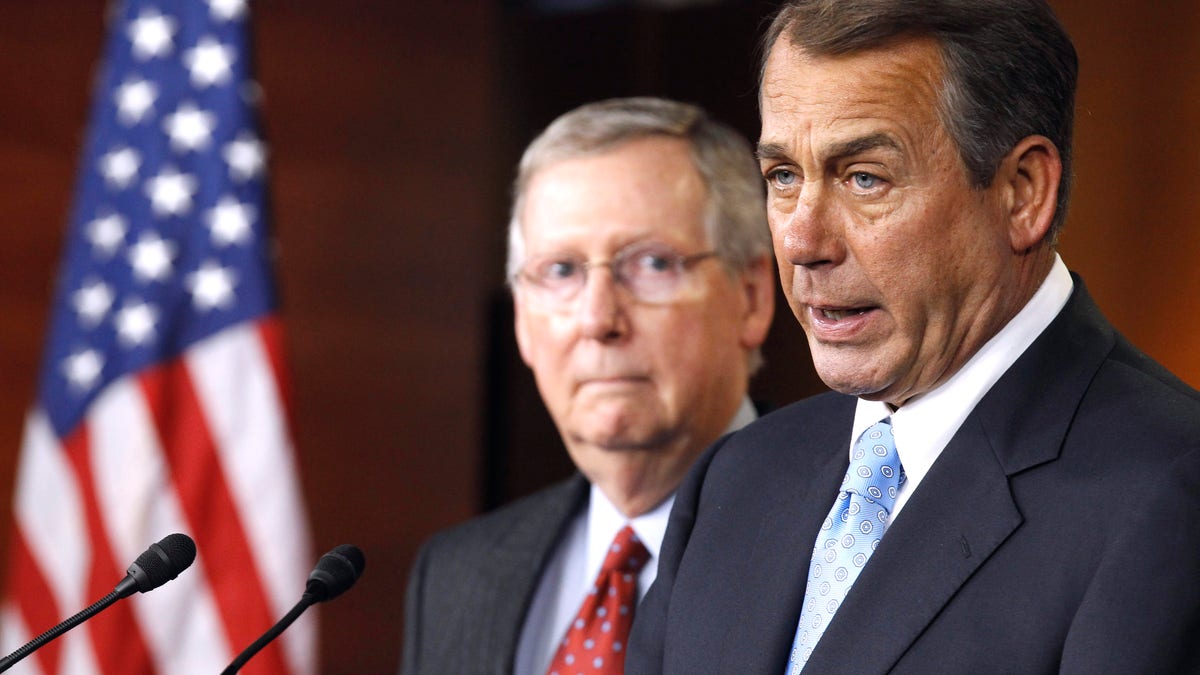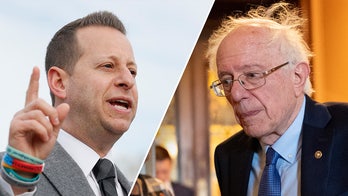
House Speaker John Boehner of Ohio, right, accompanied by Senate Minority Leader Mitch McConnell of Ky. speaks during a news conference on Capitol Hill in Washington, Wednesday, March 2, 2011. (AP) (AP2011)
While Congress is expected to approve a three-week stopgap measure next week to buy more time for negotiations on a longer-term bill, a growing wave of freshmen and conservative lawmakers in the House are refusing to play ball until federal spending is slashed -- even if that means not increasing the debt ceiling.
Rep. Tim Huelskamp of Kansas echoed the sentiment of many of his fellow freshman lawmakers when he announced he wouldn't support the short-term spending plan.
"We were elected to make bold changes to federal spending and to reverse our unsustainable deficits," he said in a statement Saturday."By allowing President Obama and Sen. [Harry] Reid to stall a budget they should have completed six months ago, we are being distracted from even bigger tasks: tackling the $1.1 trillion deficit in the president's reckless 2012 budget and negotiating real budget reform, such as a balanced budget amendment, within a debt ceiling debate."
Obama and the Senate's top Republican both declared on Friday they want to take on the huge entitlement programs driving America's long-term deficits -- but their lines of attack differed sharply and that could lead to a showdown over government borrowing.
Senate Republican Leader Mitch McConnell warned that GOP senators would not vote to increase the federal debt limit unless Obama agreed to significant long-term budget savings that could include cost curbs for Social Security, Medicare and Medicaid, laying down a high-stakes marker just weeks before the limit is reached.
Obama said he also wants to tackle military spending and tax loopholes -- issues on which he can expect Republican opposition.
The president said at a news conference that he would be ready to dig into the nation's long-term financial problems after he and lawmakers reach a deal on funding the government through September. Republicans and Democrats have been debating a short-term funding plan for weeks but are still far apart.
The short-term spending plan contains $6.1 billion in budget savings by rescinding unneeded money from the Census Bureau and other accounts, killing programs proposed for termination by Obama and emptying accounts set aside for lawmakers' earmarks.
It also involves day-to-day operating budgets -- not major benefit programs like Medicare, Medicaid and Social Security that are seen by most budget experts as long-term contributors to the nation's spiraling debt. The three programs will make up more than 40 percent of federal spending next year. If left unchecked, they will grow to more than 60 percent of federal spending by 2035, when baby boomers will be at least 70.
The federal government's tax revenues are at their lowest level in 60 years, when measured against the size of the economy, largely because of a weak economy and the extension of Bush-era tax cuts approved in December, according to the nonpartisan Congressional Budget Office.
Republican leaders have steadfastly opposed moves to bring in additional money by closing tax breaks such as those designed to help businesses.
McConnell has been pushing Obama -- publicly and privately -- to work on a bipartisan plan to rein in the massive benefit programs before they swamp the government. McConnell was purposely vague about how he would address them in Friday's interview. But by threatening to withhold votes to raise the debt ceiling, he gave the issue a new sense of urgency.
"Republicans in the Senate will not be voting to raise the debt ceiling unless we do something significant about the debt," McConnell told The Associated Press. "I don't think he has to lay out in public exactly what he's willing to do, but we need to begin serious discussions, and time's a wasting."
Democrats cannot increase the debt ceiling without Republican support in both the Senate and House. The Treasury Department estimates the government will hit the $14.3 trillion debt ceiling sometime between April 15 and May 31. The administration has warned Congress that failing to raise the debt limit would lead to an unprecedented default on the national debt.
A failure by the government to meet its debt obligations would drive up the government's borrowing costs and also raise borrowing costs for private U.S. companies and consumers.
"Even a very short-term or limited default would have catastrophic economic consequences that would last for decades," Treasury Secretary Timothy Geithner said in a Jan. 6 letter to Congress.
Many Republicans and some Democrats in Congress say now is the time to act, before credit markets force action by reducing their appetite for Treasury bonds. Rep. Paul Ryan, R-Wis., chairman of the House Budget Committee, said Thursday that House Republicans will address entitlement programs in the 2012 budget plan they will unveil in April.
In the Senate, a bipartisan group of three Democrats and three Republicans meet weekly to discuss ways to address all of the nation's long-term financial problems.
McConnell said he has no intention of going it alone on entitlements, without the White House.
"I applaud all of the discussions that are going on in the House and the Senate by well-meaning members," McConnell said. "But without presidential leadership, nothing will happen. We will not get a result."
Fox News' Chad Pergram and The Associated Press contributed to this report.




